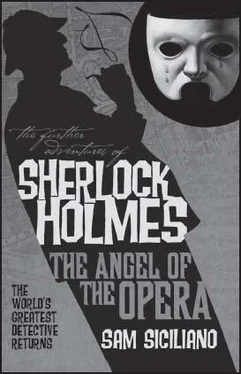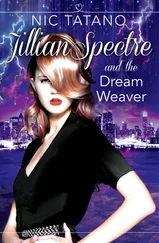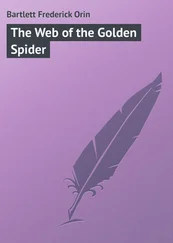Sherlock and Henry smiled, while a ripple of laughter slipped from Violet’s lips. “Very close. Not obscure—dark, a dark wood.” Her smile faded away. “‘ Una selva oscura ’. ‘In the midst of the path of our life, I found myself in a dark wood where the straight way was lost.’ The first stanza from Dante’s Inferno —Hell. ‘ A quanto a dir qual era e cosa dura esta selva selvaggia e aspra e forte che nel pensier rinova la paura .’” The words sounded beautiful, but she spoke them sadly.
I shook my head. “I dare not try to make that out.”
Sherlock smiled. “The second stanza. ‘Ah, how hard to say how this wood was savage, bitter and dense; even thinking of it renews the fear.’ The syntax is rather twisted, but there is nothing in English like ‘ selva selvaggia ’; ‘savage wood’ is not so melodious.”
“Nor can fear compare to ‘ paura ’,” Violet said. “You seem very familiar with Dante’s Divine Comedy , Mr. Holmes.”
“Yes. I read it while at university, and I still pull out my copy occasionally.”
Henry gave his head a shake. “The Italian is beautiful, but I grew tired of all the misery in the Inferno . One must give Dante credit for making art out of poetic spleen and fiendish torture. A bit twisted, though.”
Violet nodded. “Revenge is rarely so poetic or beautiful, nor does it often rise to the level of art, but Dante’s language is sublime. I love the Italian country, too, all that sunshine and spontaneity, and of course the food.”
“Did you not travel there just after your marriage?” Holmes asked.
Violet was smiling, but the right side of her mouth straightened, then twitched. She swallowed, the expression in her eyes suddenly changing. “Yes. I... I came down with a common traveler’s ailment and felt quite dreadful. I believe it was some bad fruit I ate in Venice. We... I had to come home early.” She managed a laugh. “I fear it still makes me queasy just thinking about it! That was not my first trip. My father loved Greece and Italy, and we spent many summers there. Sometimes I long to just run away to some beautiful villa in Tuscany or perhaps by the sea. But come, we should be gazing at the other spectators, rating their apparel, and sharing the latest gossip. We have little time for this amusing sport, for the performance is about to begin.”
“That does not stop most ladies,” Holmes said.
Violet laughed. “Very good, Mr. Holmes. My sister-in-law is one of the worst offenders. We have this large box to ourselves, a blessed occasion—as you would know if you had ever endured a performance in the company of Donald and his relations! The worst was the time the Reverend Killington accompanied us.”
Holmes’ brow furrowed. “Whatever could have persuaded him to attend? And what was the performance— Parsival ?”
“Oh, no—Wagner is the Antichrist. It was Saint-Saëns’s Samson and Delilah . He approved heartily of the temple coming down at the end. Let us be seated. Michelle and I shall be in the middle where I can talk to her.”
We sat in the front; Violet was on my left, then Sherlock, with Henry to my right. The chairs had red velvet seats and padding over the arms. They were much more comfortable than anything in the stalls below, and the view was perfect. The balconies swung about in a great U; we were up one level very close to the stage on the right-hand side. The orchestra in the pit began to warm up. Violet handed me a book.
“You and Henry may share one libretto, Mr. Holmes and I the other.”
Holmes glanced overhead at the massive chandelier. “As usual, there is plenty of light. I would prefer the Bayreuth custom of dimming the lights in the auditorium during the performance.”
Violet raised her right eyebrow. “Ah, but then one might be forced to watch the performance rather than the other spectators. And have you really been to Bayreuth? Oh, how I envy you!”
“You were going to explain the plot to me,” I said.
“Yes.” Violet put her gloved hand over mine. “The title, Il Trovatore —‘The Troubadour’—is misleading.”
Holmes nodded. “Verdi thought of calling it The Gypsy .”
“That would have been better,” Violet agreed. “Azucena is the gypsy in the opera. An evil count has burned her mother at the stake as a witch. In revenge, long before the opera begins, Azucena has stolen one of the count’s sons. But I do not wish to give too much away. If you get confused, nudge me, and I shall untangle things for you. The three other main characters are part of a love triangle: the tenor Manrico—Azucena’s supposed son—the soprano Leonora, and the baritone Conte di Luna, the old count’s son and successor. Just remember, at heart the opera is about Azucena’s vengeance and other dark passions. The music is sublime, although, in real life, human misery is never so beautiful.”
Soon the brief overture began. The first scene with a chorus of soldiers did not catch my attention, but the second with the heroine Leonora, and the two men quarreling over her, was more interesting. Violet and Sherlock were clearly excited about the tenor and the soprano, but the high pitch of their voices sounded odd to me. I preferred the warm baritone of the count, and he was pleasant to look at with his black goatee, doublet, and tights. Henry and I shared a pair of opera glasses.
During the second act, the opera truly came alive. The anvil chorus of the gypsies (even I recognized it) was great fun, but then the chorus trooped offstage and the gypsy Azucena began to sing to her son Manrico. Her voice was very dark—smoky, even; she hardly sounded like a woman—but gripping. I peered through the glasses at her. The makeup on her face was obvious—the lines for wrinkles, the false shadows—but her dark eyes appeared genuinely haunted. She had on a white wig, and large golden circles dangled from her ears. She wore a red dress, a black handkerchief over her hair, and a black shawl over her shoulders. Truly she seemed possessed.
I followed her words in the libretto. She explained how she had struggled to get through the crowd with her baby, desperately trying to reach her condemned mother, “ ma invano .” The music was low and ominous, the violins playing a plaintive, re-occurring sigh. Before the ghoulish crowd drove her mother into the roaring fire, she cried out to Azucena, “ Mi vendica ”—“Avenge me.”
I would not have thought the gypsy could be any more intense, but then she sang how later she stole the evil count’s baby. She was determined to throw the baby into a fire of her own, but she hesitated, disturbed by the child’s crying. Then she saw the cruel mob and the flaming pyre again, her mother’s pale ghost screaming “ mi vendica .” She hurled the baby into the flames, but when the fatal delirium faded, she saw the count’s baby next to her.
“ Ah! Che dici! ” sang the tenor Manrico. “What are you saying?”
The music built to a tremendous crescendo. “ Il figlio mio—mio figlio avea bruciato! ” The Italian was simple enough: “My son—I had burned my son!”
“ Orror! Quale orror! ” The tenor seemed genuinely horrified. So was I. She had thrown her own baby into the fire. A shiver worked its way up my spine.
I glanced at Sherlock and Violet. They were absolutely transfixed, in another world. I think that for them, Henry and I, the audience, no longer existed. Violet’s cheeks were flushed, her pallor gone, but her excitement somehow did not look healthy.
The tenor repeated “ orror ” several times, and then the music died down even as flames would. Manrico asked who he was if he was not her son, but Azucena stubbornly told him he was her son. The moment was past; the story went off in another direction. When the scene ended, the tenor and the contralto, Azucena, were loudly applauded, but during her brief solo bow, shouts of bravo filled the hall.
Читать дальше












